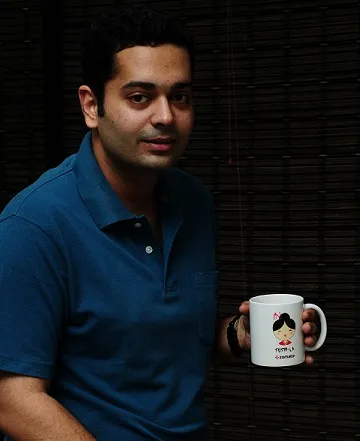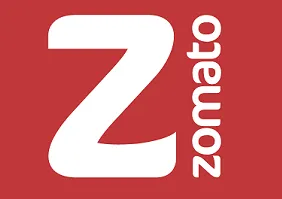"I was the worst salesman possible when I began," says Pankaj Chaddah, Co-Founder, Zomato
Zomato is all about food and where you can find the best of it.
goes the mantra of Zomato and that is what it has come to symbolize of. Founded by the trio of Pankaj Chaddah, Deepinder Goyal and Gunjan Patidar, Zomato has been one of the most promising startups from India. While still at Bain & Company, Deepinder had started up Foodiebay and Pankaj joined him soon afterwards. Building from there, rebranding in the process, Zomato has come a long way and has managed to occupy a huge mindshare amongst Indians online. We got in touch with Pankaj Chaddah, the brain behind Zomato's marketing programs to know how his journey has been and also the secret sauce for the Zomato recipe.

Tell me about your startup journey. How has the experience with Zomato been?
I joined Bain in July 2007 where I met Deepinder. He had been working on Foodiebay for a few months before I got on board in mid 2008. Together, we worked at Bain for a year and a half while dedicating weekends to Foodiebay. By the time we left Bain, we had already launched in 4 cities (NCR, Kolkata, Mumbai & Pune) and had a handful of clients on board. It was getting difficult to manage both and before Foodiebay could affect our work at Bain, we decided to quit and work full-time on Foodiebay; luckily, by then, we had we also had Gunjan to work on the tech side of things. While at Bain, we could sustain the on the financial side but it became difficult after we quit our jobs. So we raised a small sum of money from our friends to keep the startup running and launched our Bangalore operations. And then to make things better and bigger, we raised our first round of funds from Info Edge and opened our first office in New Delhi.
Overall, the experience has been great. I love my job and can proudly say that most of the people at Zomato will also say the same.
Why did you rebrand?
We had changed our name from Foodiebay to Zomato in late 2010 for 2 primary reasons - one was the fact that Foodiebay would restrict us to only food and restaurants and venturing into any adjacencies (even nightlife) would be very difficult with such a brand; second was that Foodiebay has "ebay" as a part of its name, which put a lingering doubt in our minds about its legality - we did not want to take chances when we were starting to invest in creating a brand.
Zomato has achieved some amazing feats over the year. What would be the key points you'd attribute to Zomato's success?
That's very good to hear! The biggest factor for us, as for any startup, has been the team and the culture around the team. We have been able to put together a great team which never says die, parties hard and works harder. I remember a client asking me a few days ago "Can I have one of your soldiers?"
Second, we have a very high focus on product which ensure our users are happy (after all, the website is for them first). Deepinder looks at product himself and the rate of new feature rollouts is amazing. It is difficult to believe that we rolled out ticketing in December and within 6 months since then, we have had two product revamps already.
The third, luck, thankfully has favored us well so far. We launched during 2008 when only a few people were thinking about internet startups. We were lucky to be working at Bain which supported entrepreneurship, lucky to find investors when we were almost broke, and to have level-headed people running the company who do not find it necessary for us to be a part of the e-commerce madness.
There are multiple sites operating in the same space. Competition is always an approval of the market but what are your views on cloning?
We have always had websites in the same space competing with us. Even when we were Foodiebay, there were at least 6-7 competing websites which came up & closed down. I feel it is about what you offer to the users which will make the product survive. We dirty our hands a lot to gather all the content - menus, photos, maps coordinates for almost every restaurant in the city. The sheer amount of content we aggregate ourselves on a daily basis is what sets us apart from everyone else. Also, we give the most targeted and transparent advertising system to merchants (restaurants) which gives them a lot of value to grow & improve their business. We watch our competition closely - most of them have data scraped from Zomato. If they do this, they can only be as good as us, not better. Overall, I am not yet convinced that the other players have strong enough value propositions, but I am sure this space will evolve very quickly.
Also, I still feel India is too nascent a market for an online ordering aggregator to work out (most of the players in restaurant aggregation are launching online ordering websites). I believe online ordering will take its own sweet time to become significant in India, lets wait and see how many players emerge in the meanwhile. For us, launching an online ordering platform is not going to be difficult. We already have the technology, we can quickly execute the sales effort when we need to.
Your bio reads you're the guy responsible for selling ad spaces :) What gives you this drive and thrill to sell? Where did you catch the knack from?
You always hear of people who are salesmen from birth, I am no way close to it. To be frank, I was the worst salesman possible when I began. During the initial days, Deepinder and I decided to split focus areas and I ended up with marketing and sales. What worked well is that I always tried to used logic in sales, was always very persistent & the best weapon was the product we sell. It is very difficult to say no to the value we bring for the merchant. Luckily we have been able to hire a lot of great people and train them really well to have around 1000 paying clients on board today.
Some believe online advertising is young in India. When we started, local merchants buying ad-space was completely unheard of. Unlike Russia, where online advertising is bigger than print, in India online advertising was always a "thing of the future". Growing Zomato's client base from zero to almost 1000 in such a market has been a lot of fun.

Tell me about some of the marketing strategies that have really clicked.
Zomato is a very viral product as it surrounds a basic necessity - food. So we always focused on word of mouth. When we started, we had heard a lot about "gratifying the user" with rewards, viral social media engagement, etc - we tried a lot of things but frankly we don't know what really worked for us in the initial days. We gathered that corporates are our best targets and used to do every form of penniless marketing we possibly could around this target group - from getting people to change messenger statuses to forcing friends to send emailers in their offices. All of these clubbed with SEO, SEM resulted in quick and loyal growth in the initial days.
Today we do everything from BTL to TV advertising to remain on the top of the user's mind, but we are very frugal compared to others in the industry. Engaging stuff on Twitter (look at our #FoodieFriday quiz) has worked very well, TV advertisements for New Year Ticketing in December were very aggressively implemented and established Zomato as a brand to watch out for among both users and merchants. Getting involved with users, specially the ones who are very active on Zomato, with physical activity like the FoodSprint we did in Delhi & Zomathon we did in Bangalore, have given us a lot of brand ambassadors who are always very highly valued by us. Our print Restaurant Guides have really helped us establish Zomato as an authority in the restaurant space.
Operationally, what are the challenges you face currently?
Till now we have been facing challenges which are nice to have - growth pangs. We are the kind of people who prioritize getting things done over creating processes for them to be done. Since the team is growing rapidly, we face breakdowns often whenever team grows beyond the "order in the chaos" stage.
We are also in the process of launching Zomato for two entirely new markets - Singapore and Dubai, and finding the right people there has been a big challenge.
What is in the pipeline at Zomato?
We always keep working on a lot of new things, we recently rolled out a set of social features on the website which has been received really well by our users - reviews written per day have gone up 5 times. We will soon have new mobile apps with all these social features integrated.
We are about to launch Zomato for Singapore and Dubai, this should happen by September end this year, a lot more international activity after that. We have a very short time to market from concept stage, so a lot of stuff coming up in the next 6 months.
Stay tuned for more from Zomato!
Quirk bite
Freakishly, 2 weeks after we changed the brand, we got a legal notice from ebay's lawyers in India over trademarks and domain names etc! We were really very happy and amused by the timing, we didn't have to care about this notice and all thanks to the timely name change (as I said, luck has been on our side).







